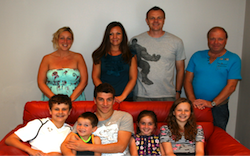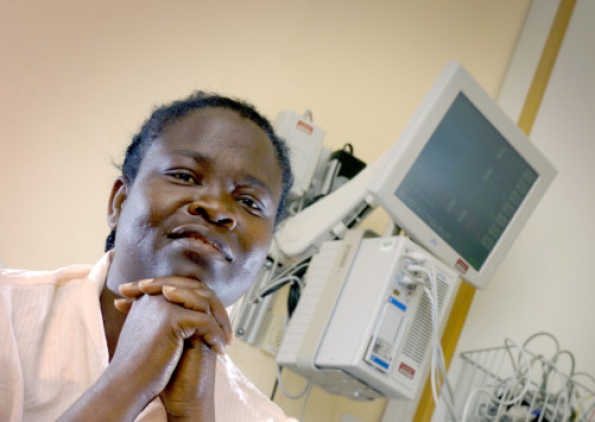2012: a year in campaigns for migrant justice
Anti-deportation campaigning can be tough. As Christmas approached, and UKBA began their seasonal assault on refused asylum seekers, the inhumanity of the immigration system loomed large.
So we thought that this new year, we would take some time to think about why campaigning matters, and how it can and does mean justice is done and migrant voices are heard.
WINNING CAMPAIGNS
Lydia and Bernard
In 2012, Lydia Besong and Bernard Batey finally won their case after a long, hard-fought campaign sustained by Lydia and Bernard’s passion in freedom and human rights, and their supporters unfailing commitment.
Lydia and Bernard, both long standing human rights activists, have fought a six-year, high profile campaign for asylum in the UK. On 16 May, the campaign team at RAPAR wrote with the brilliant news that the asylum Tribunal finally recognised that their political and cultural activities will place them at risk if they are returned to Cameroon.
“This is a deeply important victory for everyone interested in ensuring the safety of our refugees” - Gary McIndoe, Lydia and Bernard’s solicitor.
Throughout their struggle the couple has been supported by the parishioners of their Rochdale church, St Ann’s, and have won the backing of human rights groups in Manchester and English PEN, the organisation which campaigns for the freedom of speech of writers worldwide.
Their campaign also drew high-profile supporters including actor Juliet Stevenson, War Horse author and former children’s laureate Michael Morpurgo, leading lawyer Helena Kennedy and Stockport-based writer Joan Bakewell. Read about the campaign here.
“Josh” and family
 Josh, originally from Iraq, arrived alone in the UK in 2007 aged 14. He was fostered and rebuilt his life with his new family, with whom he has now lived for over four years. His new family were devastated when his discretionary leave ended and he was refused asylum. His British family said, when launching their campaign for Josh to stay in the UK:
Josh, originally from Iraq, arrived alone in the UK in 2007 aged 14. He was fostered and rebuilt his life with his new family, with whom he has now lived for over four years. His new family were devastated when his discretionary leave ended and he was refused asylum. His British family said, when launching their campaign for Josh to stay in the UK:
“Our son is kind, generous, gentle, warm and friendly. He is a credit to our loving family. Our children are all honest and highly respectful. We feel very proud of them all. Having to fight to keep our family with us, this just doesn’t seem fair. Our son needs his family and we need him. The threat to remove our son would rip the hearts out of us as a family, as it would do by removing any child from their home. Our son’s life would be destroyed by this proposed removal and so would ours.”
Josh’s British family had not known anything about the asylum system before they were faced with the terrible prospect of losing him. Disgusted that the UK could treat their son this way, his family launched a campaign for Josh to be granted the right to stay in the UK with his family. After a long legal fight and a difficult emotional journey, we were over the moon when Josh’s family contacted us late in 2012 to tell us had finally been granted leave to remain.
Khethiwe
Another great community campaign that resulted in victory in 2012 was Khethiwe Must Stay.
Khethiwe is from Zimbabwe but has made her home in Bristol. As a known human rights activist, she would have been in serious danger if returned to Zimbabwe. Khethiwe is well known to many different groups in Bristol, as a regular volunteer for Bristol Refugee Rights, as a prominent member of the local branch of the Movement for Democratic Change in Zimbabwe, as a keynote speaker and vital volunteer with the City of Sanctuary movement in Bristol, as a human rights activist and as a gardener with the asylum seekers allotment project. These community links were essential in quickly galvanising widespread support for her campaign.Weekly protests were held in Bristol following Khethiwe’s detention (when she was threatened with removal), attended by key local political figures.
The campaign grew and grew, and in November, Khethiwe’s campaign group announced:
DIFFICULT LESSONS LEARNT
In February, we were reminded that while airline campaigning against an imminent removal/deportation can stop a flight and buy vital time for a legal case to progress, in all too many campaigns it is not enough to halt the heartbreaking enforced removal of a friend, family or community member. The removal of H to Angola showed only too clearly the disadvantages of last-minute campaigning compared to campaigning from the earliest point possible, with more time to build up strategies and supporters. It also highlighted how campaigning must include an engagement with, understanding of and sharing of information about the legal process of applying for asylum or other immigration status, as there are so many barriers to obtaining good legal advice in the time allowed. As we explained to our supporters shortly after H’s removal:
We sent out an urgent campaign alert for H, the young woman from Angola who arrived five years ago as an unaccompanied child, who was refused protection and was facing forced removal.
The response was overwhelming - so many of you contacted the Home Secretary and Portuguese airline TAP to demand a stay on the removal. Sadly, H was forcibly returned last night.
We were in contact with H by phone to the end, even as she sat on the plane. H told the flight attendants that she was being taken against her will, that her father was in the UK, that she had nothing to return to in Angola, that she was afraid. But they said there was nothing they could do. This wasn’t true. It was within their power to ask the security guards to remove her from the plane, as many others have done in recent months.
H was frightened and exhausted. It was too much for her to make much fuss. And she was surrounded by FIVE private security guards from Reliance, three men and two women. In her Glasgow accent she said “and I’m just a wee girl”.
We told H that so many people were backing her - from NCADC supporters to her social workers and their colleagues to her MP. She was heartened by this news, but as the day and evening wore on she became quieter.
We are convinced that H, like many people deported from the UK, had a good legal and humanitarian case for asylum. But like so many she has been let down by a lack of quality, early legal representation, and a detention system that meant that the solicitor who took over had very little chance of gathering the evidence to halt the removal in such a short space of time.
We also believe that H’s story had all the makings of a solid community campaign, if only she had began it earlier. But we cannot blame people like H for leaving it to the end, once in detention when the route to legal justice became so obviously blocked. It’s hard, especially for a vulnerable young care-leaver, to contemplate going public, asking for the help and solidarity of friends and strangers.
A lot of the work we do at NCADC is behind the scenes, advising individuals and groups on their rights, and the various avenues open to them. Sometimes we need to call upon your help in an emergency, and yesterday you responded. It didn’t succeed, but we tried. We will keep on trying, together, and sometimes we will win.
The Saleh family’s ordeal in October demonstrated the real highs and lows of anti-deportation campaigning.
Mrs Saleh, an Egyptian national, applied for asylum in the UK after escaping an abusive and cruel husband whose acts endangered her and her children’s lives for over 15 years to the extent of death and rape. The Egyptian authorities ignored this domestic abuse as her husband has close links with police, judges and other officials. The campaign was based on the threat the whole family faced of honour-based violence and possibly even death if deported back to Egypt.
The family had tremendous community support in Cardiff, where they lived, and across the UK. They were much-loved, and everyone was devastated when they were picked up in a dawn raid, and subsequently detained in Cedars, where even more distressing events took place (read more on our blog post here).
A fantastic response to calls for airline campaigning action prompted Egypt Air to publicly Tweet that the family were not on board the scheduled removal flight.
UKBA then took the extraordinary step of arranging a private chartered flight to remove the family - at huge expense. Charter flights are routinely used by UKBA to carry out mass deportations to, amongst others, Sri Lanka, Afghanistan, and multi-destination flights to Africa. It is highly unusual for one family to be targeted in this way, and reveals just how scared UKBA are of public anti-deportation campaigning.
Charter flights depart from unknown airports and are operated by unknown airlines, leaving few avenues for campaigning. In the Saleh family’s case, there was also no time for legal steps to be taken. The government’s action in this case exposes what we are up against, and that we will not always win. But it also made it clearer than ever that this inhuman, cynical persecution of migrants must be laid bare.
THE FIGHT CONTINUES
Roseline Akhalu
 Rose came to the UK in 2004 to study a Masters degree at Leeds University. After arriving in the UK, she was diagnosed with renal failure. A successful kidney transplant saved her, but she needs to take immunosuppressant drugs for the rest of her life. Such drugs are prohibitively expensive in Nigeria and so, if deported, Rose could die within four weeks.Rose has a very strong campaign which has received national media attention, and interventions from celebrities such as Colin Firth.
Rose came to the UK in 2004 to study a Masters degree at Leeds University. After arriving in the UK, she was diagnosed with renal failure. A successful kidney transplant saved her, but she needs to take immunosuppressant drugs for the rest of her life. Such drugs are prohibitively expensive in Nigeria and so, if deported, Rose could die within four weeks.Rose has a very strong campaign which has received national media attention, and interventions from celebrities such as Colin Firth.
In November 2012, the Immigration Tribunal agreed with Rose, and granted permission to stay. However, in a shocking move, the Home Office solicitors have appealed the decision.Rose’s campaign group said:
“The immigration judge in Rose’s case accepted that if Rose were to be returned to Nigeria she would die within 4 weeks. He accepted that she has been a committed and much valued member of her local community which would suffer were she to be forcibly removed by the Home Office.
For the Home Office to challenge the decision of its own immigration tribunal, and to waste thousands of pounds of taxpayers money in order to threaten a sick and frightened woman with a death sentence is vindictive. No country that allows its government to behave in this way can call itself civilised.”
Find out more here.
Ivo Kuka
 Ivo Kuka fled his homeland after being tortured and sexually assaulted in Cameroon for membership of the Southern Cameroons National Council (SCNC), who call for independence for English-speaking Southern Cameroon from French-speaking Republic of Cameroon. Let down by the UK asylum system, he was forced to attempt to appeal his case himself and is now at risk for removal.
Ivo Kuka fled his homeland after being tortured and sexually assaulted in Cameroon for membership of the Southern Cameroons National Council (SCNC), who call for independence for English-speaking Southern Cameroon from French-speaking Republic of Cameroon. Let down by the UK asylum system, he was forced to attempt to appeal his case himself and is now at risk for removal.
See his campaign page to find out what you can do, and listen to Ivo telling his story on Refugee Radio.
ISSUE-BASED CAMPAIGNS
NCADC sees individual campaigns and issue-based campaigns as important interconnected areas of our work. The individual campaigns we support and advise help show the world the human impact of unfair and unjust asylum and immigration practices. Issue-based campaigns provide the bigger picture - the context in which individual cases are fought.
We believe, and research consistently confirms, that decision-makers and the general public can connect with human stories of injustice in a way they cannot with abstract, general ideas. Even xenophobic, racist attitudes break-down in the face of compelling individuals testimonies. And each person’s story matters, and should be heard.
But things need to change in the immigration system too: in the law, in the policy through which law is enacted, in the behaviour of UKBA and the courts, in the representation of migrants in the press, in the attitudes of the general public. Only then will we see a significant improvement in decisions being made, and the treatment of migrants as human beings with dignity and rights.
This is why NCADC works with our friends and colleagues to raise-awareness and lobby for change in key areas of injustice. We facilitate Young People Seeking Safety - a network of young people, groups and individuals who support young people seeking safety in our local communities. YPSS provides a formal platform for local and national groups across the UK to communicate, meet and work towards ensuring the care and human rights of young asylum seekers in the UK.
We are a part of the Detention Forum, calling for an end of immigration detention. We campaign against the privatisation of the immigration system - from asylum accommodation, detention, enforced removal, to ‘bounty-hunting’ - and speak out against the pernicious encroachment of corporations into judicial and statutory functions.
Destitution and homelessness are important issues also, so often used as tools to coerce vulnerable migrants into leaving the UK.
As well as running an information service on asylum immigration and human rights issues in general, we pay particular attention to exposing the worst deportation practices, such as the use of charter flights; and deportations to war zones like Afghanistan, and to situations of torture, as occurs in DRC and Sri Lanka, and an alarming number of other states.
It’s going to be another busy year!
